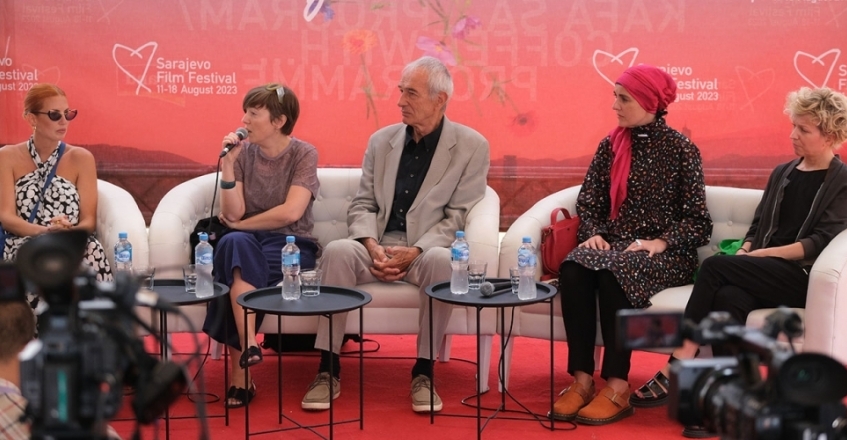Objave
Public Discussion on "Femicide in Film, Television, and New Media" Takes Place
In response to the crime in Gradačac, the Sarajevo Film Festival organized a public discussion on the subject of "Femicide in Film, Television, and New Media" at the Festival Square on August 16th.
Filmmakers who have addressed the theme of violence against women in their work and through their social engagement discussed artistic and media representations of such violence. The panel included directors Aida Begić, Vanja Juranić, Kumjana Novakova, director Ademir Kenović, and actress Nadine Mičić, with the discussion moderated by Nebojša Jovanović.
Director Vanja Juranić dedicated the festival screening of her film ONLY WHEN I LAUGH to the murdered Nizama Hećimović.
"Violence against women and domestic violence happen everywhere. I made the film after a case in Croatia several years ago whose verdict frustrated me. It was clearly misogynistic, chauvinistic. I felt the need to engage with it more and eventually make a film," Juranić said.
Actress Nadine Mičić, who portrays a role in the film ONLY WHEN I LAUGH, reflected on the treatment of the violence-enduring heroine.
'Stay at home, don't let anyone see you like that.' That's what the character’s best friend says in the film. That's the society we live in. We are a society that nurtures violence, these problems were implanted far earlier, and we pass them on to our children," Mičić said.
Regarding the working conditions of female workers in the film industry and women in the media scene, Mičić highlighted the impact of the "I Didn't Ask For It" movement, initiated after reports of sexual abuse made by actress Milena Radulović in 2021. Initially fearing that no one would respond to the campaign, which invited women to speak about the violence they had experienced, she said that more than 3,000 women from the entire region came forward within just seven days.
Director Aida Begić spoke about her films BALLAD, based on the ballad "Hasanaginica," and SNOW, as well as about the normalization of violence against women throughout the history of Yugoslav cinema and its integration into popular culture discourses.
“Lines like 'Don't, Fako, for God's sake' were being recited, and it was almost normal in every film, as if that's a part of our life. That began to change when a group of women, which emerged after the 1990s war, undertook a different approach to the content of our films, both in front of and behind the camera, which we still talk about today through the 'Me Too' movement," Begić said.
Begić also added that the state of cinema is changing today and that a woman doesn't have to be portrayed as a heroine for violence against her to be considered unacceptable.
Director Kumjana Novakova agreed with Aida Begić's observation that the situation in domestic and regional cinema is shifting and that more and more women are getting space and a voice. However, she pointed out that feminist authors cannot solve all problems themselves.
"It's unfair to expect that and put pressure on them. Culture and art are there to create a space for certain processes to accelerate. Systemic solutions don't lie in film and art," Novakova said.
Ademir Kenović discussed his 1989 film KUDUZ, which also addresses the issue of femicide. He emphasized that the protagonist is not a heroine in the classical sense, but that it doesn't make her any less deserving of understanding and empathy.
The panel concluded with the message that art cannot take on a legislative role, but that it is nevertheless essential for it to address themes and behavioural models which are deeply rooted in society with caution, self-awareness, and critical examination, as they often go unquestioned and unexamined.
The discussion on the topic of "Femicide in Film, Television, and New Media" was the only public event on August 16th in the programme of the 29th Sarajevo Film Festival.
The Sarajevo Film Festival observed a Day of Mourning with the message: "Solidarity with all victims of violence against women."






